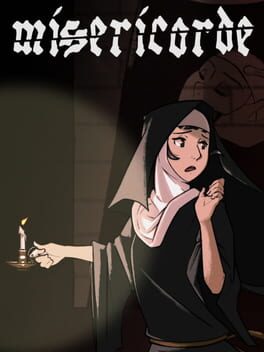This review contains spoilers
While the initial premise of Misericorde is definitely flimsy, it's pretty much the last part of the plot that is, because once the story is unleashed it becomes an intense character study of the MC and everyone else around her. Pretty much all of the characters are well-developed and interesting, each with their own stories of how they came to be in the abbey, flaws, and friendships/alliances.
This is an extremely layered story, which is fantastic and frankly way more complex than I expected out of a VN. You as the reader and the MC are both learning about a new world from adjacent angles - we as readers are coming to learn about the world as full-on outsiders, MC has only theoretical knowledge from books (which some readers probably share). She's also much more religious than almost everyone else in the convent, and she's forced to come to terms with that. The layered tension between the player and the MC and the MC and the other characters is a really interesting experience, I think.
Like Pentiment, this is a love letter to medievalism, and there are historical aspects that have clearly been well-researched. My biggest complaint, however, is that UNlike Pentiment, the dialogue is fairly modernized. I assume they did it to make it more approachable, but it feels anachronistic. There are a few moments of comedic relief (the infamous "duck" one referenced in Steam reviews being one of them) and one character who at first seems pretty memey (but has more depth later) that also do more to detract from the game than add. I think they should have just leaned into it being serious and let small moments of humor diegetically emerge anyway, like Pentiment did. Then again, holding any writer to Josh Sawyer as a standard just seems unfair.
Also, it's hard to adequately describe this, but the way the narrative focuses and unfocuses can at times be distracting. The game takes place in the span of just a few days, so there's a lot of focused attention to small moments. But sometimes the moments that it chooses to zoom in on feel like odd choices. This does get used to its strength in places, though - one that comes to mind is that chess is used as a metaphor for the events at the abbey throughout, and there's a point at which we see the details of several chess matches in a row that are really great metaphorical representations of the different characters' personalities. There's just a bit of a pacing issue where the VN drags in the center.
That said, the end had something that surprised and delighted me, and left me incredibly excited for part two. I can't wait.
This is an extremely layered story, which is fantastic and frankly way more complex than I expected out of a VN. You as the reader and the MC are both learning about a new world from adjacent angles - we as readers are coming to learn about the world as full-on outsiders, MC has only theoretical knowledge from books (which some readers probably share). She's also much more religious than almost everyone else in the convent, and she's forced to come to terms with that. The layered tension between the player and the MC and the MC and the other characters is a really interesting experience, I think.
Like Pentiment, this is a love letter to medievalism, and there are historical aspects that have clearly been well-researched. My biggest complaint, however, is that UNlike Pentiment, the dialogue is fairly modernized. I assume they did it to make it more approachable, but it feels anachronistic. There are a few moments of comedic relief (the infamous "duck" one referenced in Steam reviews being one of them) and one character who at first seems pretty memey (but has more depth later) that also do more to detract from the game than add. I think they should have just leaned into it being serious and let small moments of humor diegetically emerge anyway, like Pentiment did. Then again, holding any writer to Josh Sawyer as a standard just seems unfair.
Also, it's hard to adequately describe this, but the way the narrative focuses and unfocuses can at times be distracting. The game takes place in the span of just a few days, so there's a lot of focused attention to small moments. But sometimes the moments that it chooses to zoom in on feel like odd choices. This does get used to its strength in places, though - one that comes to mind is that chess is used as a metaphor for the events at the abbey throughout, and there's a point at which we see the details of several chess matches in a row that are really great metaphorical representations of the different characters' personalities. There's just a bit of a pacing issue where the VN drags in the center.
That said, the end had something that surprised and delighted me, and left me incredibly excited for part two. I can't wait.
